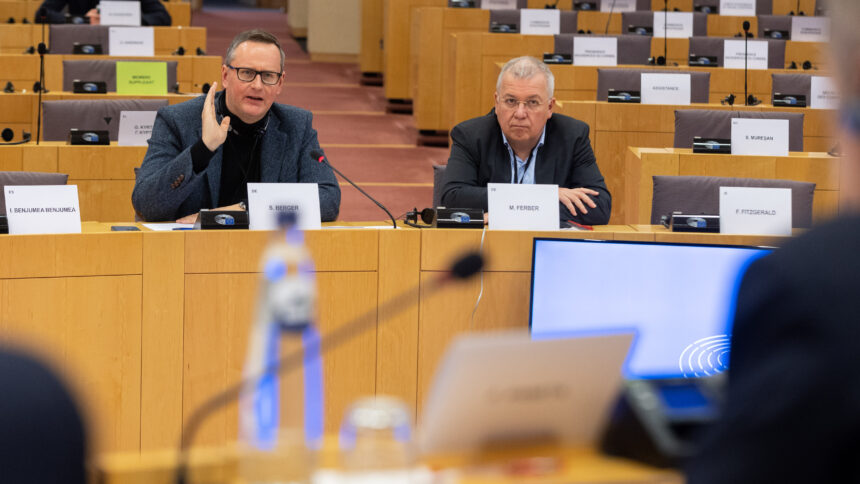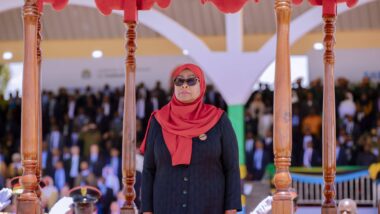The German language has a word for the fear of not getting something done before a deadline: „Torschlusspanik“. Originally, this referred to inhabitants of a walled city panicking when the guards shut the city gates for the night. But in the last few months before the European elections, it would also have worked to describe the mood among EU lawmakers.
The reason: The EU Parliament had its last plenary session before the elections in April, shutting down further progress on any lawmaking until autumn. This meant that the delegates wanted to finish as many projects as possible before the elections – also because of the fear of the far-right collecting enough votes to turn the Parliament in their direction.
This was also true for the Parliament’s Committee on Economic and Monetary Affairs. In mid-2023, the EU Commission had presented new draft laws on retail investing, or on how companies should be rated on their sustainability. The committee managed to push both laws quite a way before the elections: It finished the draft for the retail investors, and the company ratings have even already made their way through the final trilogue negotiations with the EU Council.
On another proposal, the committee did not make as much progress: the Digital Euro.
With this project, the EU wants to introduce a digital version of the Euro. This is supposed to work in stores and online, collect little data, and work in all Euro countries. The Commission presented its proposal for the corresponding law at the end of June 2023. The member states in the Council have been working on their draft of the law since then. In Parliament, it’s the already mentioned economy committee that is responsible for the law. But up until now, it has not been able to agree on a common position.
Other groups dissatisfied
The ball is in the court of the German delegate Stefan Berger from the conservative European People’s Party (EPP). Before the Digital Euro, Berger was the lead negotiator for an EU law on cryptocurrencies, making a name for himself in the digital currency world. Now, he’s not only responsible for the Digital Euro law, but also another law which the Commission proposed in parallel to strengthen the position of cash. Both form a common package.
With him at the negotiating table are delegates from the other political groups in Parliament. While Berger is the rapporteur for the proposal, the other negotiators are called the shadow rapporteurs. And this spring, three of these shadow rapporteurs were just about done with the slow progress in the Digital Euro negotiations. They detailed their complaints in a letter to the chair of the economy committee, which we are publishing in full.
Delayed working process
„We write to express our collective concern on the handling of the package by the rapporteur and we invite the Coordinators to draw lessons from that,“ the letter starts. The coordinators are delegates which lead the work of their groups in a Parliament committee. More on that later.
„Regrettably, we have observed that the EPP rapporteur has delayed the working process from the start,“ write the three delegates: Paul Tang from the Dutch Social Democrats, Gilles Boyer from the French Liberals, and Henrike Hahn from the German Greens.
They list several cases in which the rapporteur supposedly went his own way without consulting with his co-negotiators. For example, they say that Berger publicly announced that he would re-open the package of Digital Euro and strengthening cash, without discussion with them. After talking to him, he walked back this announcement.
Following that, the negotiators together set a new deadline: They wanted to finish the drafts for the two proposals by January. But Berger did not stick to this deadline for the Digital Euro draft. „After many, repeated requests,“ he then presented a proposal draft in February. Based on that, the rapporteurs then have to negotiate until they can agree on a common proposal.
„Disrespectful“
But Berger did not show enough initiative for this, according to Tang, Boyer, and Hahn. „We have attempted to help the rapporteur by bringing forward twice a starting compromise proposal reflecting amendments from a wide variety of groups but that has fallen to the rapporteur’s deaf ears,“ they complain in their letter. In the months leading up to the last committee session, Berger supposedly did not organise any meetings, even though they would have been available.
„Overall, the actions of the rapporteur are at odds with a democratic process,“ the three delegates criticise. The rapporteur supposedly blocked progress on an „important and highly sensitive piece of legislation“ without consulting with the other responsible delegates. „This has been disrespectful to the shadows and their teams.“
They describe the cooperation as „extremely difficult“ and call on the coordinators „to make sure that Mr Berger, or any other Rapporteur, is willing to actually move forward and conclude the Single Currency Package, has a clear and credible outline and adheres to it in accordance with the democratic rules and procedures in the European Parliament.“
Will Berger be responsible again?
Two of the three delegates will not be working on the Digital Euro anymore: Henrike Hahn and Paul Tang did not stand for re-election. Gilles Boyer did stand and was re-elected. But if he will continue working on the Digital Euro is so far unclear.
Stefan Berger also re-entered Parliament. If a delegate is re-elected, they usually take over any projects that might still have been left open from their last mandate. Berger did not comment on whether he again wants to be rapporteur on the Digital Euro – and how strongly he would push for Parliament finding a common position. He also did not comment on the allegations in the letter to the economy committee chair, pointing us towards answers he gave in a paywalled Politico Pro article.
Thirty years a delegate
But besides Berger, there is apparently a second EPP delegate who is important for the Digital Euro. This is where we come back to the coordinators mentioned already: The name of the EPP coordinator in the economy committee is Markus Ferber. According to several people involved in the process, he was quite significant for the work done so far on the Digital Euro. „I’m a member of the committee, I’m the spokesperson of the largest group. In that respect, I’m involved, even if I’m not on the negotiating team,“ Ferber said to netzpolitik.org.
The Augsburg-born Ferber has been in the EU Parliament since 1994. In this time, he worked on important laws in the financial sector: Against bets on state defaults, for example, or against money laundering.
There have also been repeated reports about his positions being close to industry. For example, he personally pushed against a proposed ban on commissions for financial products. The EU Commission – the institution, that is – was planning on protecting retail investors, but the ban did not materialise. In negotiations on new rules for insurances he pushed for deleting criteria on sustainability.
Ferber does not see conflict of interest
There are also financial connections between Ferber and the banking industry. Next to his monthly income of 10,377 Euros as a delegate, Ferber declares several secondary incomes: 600 Euros per month from the Augsburg branch of the German Sparkasse banks, 2,500 Euros per year from a political advisory board to the same banks plus 400 Euros per session of that board, 2,000 Euros per session of an advisory board for the separate Sparda banks, and finally 20,000 Euros per year for sitting on an advisory board to Deutsche Vermögensberatung, a financial advisory company.
Deutsche Vermögensberatung stated to netzpolitik.org that a membership in its advisory board did not entail any expectations, meaning there was no conflict of interest. Sparda banks and the Bavarian association of Sparkasse did not react to requests from netzpolitik.org.
Ferber said to netzpolitik.org that he does not see a conflict of interest in his function for Sparkasse. He also stated that there were also representatives of other political groups in the cross-party advisory boards which also all declared their interests according to the relevant rules.
Last week, the German association Finanzwende published a detailed report on Ferber and his lobby connections. „Markus Ferber’s one-sided lobby contacts, his sideline activities and the political work of the delegate in the Committee on Economic and Monetary Affairs outline an image of a politician acting in the interest of Big Money,“ states the report. The association does not want Ferber to get any leading positions in the coming mandate of the Parliament. Ferber has already announced that he will take Finanzwende to court over the allegations. He did not react to a request for comment by netzpolitik.org on the report.
Banks want to weaken Digital Euro
Connections to banks are especially interesting because they are, mildly speaking, not enthusiastic about the Digital Euro project. Phrased differently: They have fundamental fears about their position in the European monetary system.
Currently, people need a bank account for many things. The Digital Euro as a public payment alternative could undermine some of those. The banks are especially afraid about customers mass-withdrawing money from their savings accounts to instead put it into Digital Euro accounts. They are therefore calling for lower limits on how many Digital Euros one person can hold. The discussion around holding limits currently ranges from 3,000 Euros to 500 Euros.
Additionally, a group of large European banks is working on a product that is set to have similar functions to the Digital Euro: The European Payments Initiative (EPI) is working on Wero, a payment system that is also set to connect EU countries. At the beginning of July, a first, limited version of the service started in Germany. But Wero is currently only planned for some EU countries, where not all banks are participating. A series of private attempts at setting up a European payment infrastructure has so far failed.
Commission should re-think proposal
In an interview with netzpolitik.org, Ferber spoke very critically about the Digital Euro. The current Commission proposal only addresses retail customers, he says: „I don’t see any added value there at all.“ He thinks that free, real-time bank transactions and the EPI will be much more important for those retail customers.
He wants a Digital Euro oriented more on the demands of companies. Additionally, he misses Blockchain and programmability. Blockchain is a data storage technology mostly used for cryptocurrencies such as Bitcoin. Some cryptocurrencies are programmable, meaning money can be directly controlled by code. The Digital Euro is set to neither use Blockchain technology nor be programmable.
Ferber also thinks the discussion around holding limits is central to make sure that not too much money from bank accounts is converted into Digital Euros: „That is one of the key problems, when even large banks in Germany tell me that there will be billions withdrawn there,“ he says. „The European Central Bank so far brushed all that away and is now starting to think harder and lower the limits. This point alone shows that it was good that we were not overhasty.“
Independently of whether Stefan Berger will again be rapporteur on the Digital Euro: Ferber wants the committee, freshly constituted after the elections, to negotiate based on a new draft law. This would make sure the new shadow rapporteurs have an opportunity to get involved, says Ferber. And: „We will also have to discuss with the new Commission whether it will uphold the current proposal,“ he says. „It’s all being put to the test.“
The Commission did not reply to a question from netzpolitik.org on whether it is thinking about withdrawing the current proposal on the Digital Euro.
This article is part of a series on the Digital Euro. The Centre Responsible Digitality financially supported the research for it through its Journalist in Residency program.
The full text of the letter written by the three shadow rapporteurs on the Digital Euro and addressed to the chair of the Committee on Economic and Monetary Affairs in the EU Parliament:
Dear Chair,
dear ECON Coordinators,
As the shadow rapporteurs working on the Single Currency Package, we write to express our collective concern on the handling of the package by the rapporteur and we invite the Coordinators to draw lessons from that.
The negotiation team jointly agreed to come to a position on this package in the plenary before the end of the mandate. Regrettably, we have observed that the EPP rapporteur has delayed the working process from the start.
We have seen the following order of events:
- On the 28th of June, the European Commission published the Single currency Package proposals
- On the 26th of October, the negotiation team agreed to treat the files as a package
- On the 28th of November, the rapporteur informed the press about wanting to split up the package without a corresponding mandate from the negotiating team and despite the aforementioned agreement.
- In the following shadow meeting on the 7th of December, a majority of the negotiating team reiterated that it wanted to treat the three files as a package, and we agreed jointly with the rapporteur on a deadline for submitting the report on January 9th. However, on that date, the Rapporteur only submitted one of the three draft reports to the secretariat without prior notification to the negotiation team and failed to table the key legislative proposal establishing the digital euro.
- After many, repeated requests, the rapporteur eventually published a draft report on the 12th of February and other groups were able to table amendments. However, the rapporteur refused to share an update timeline or to present compromises on the proposal establishing the digital euro. We have attempted to help the rapporteur by bringing forward twice a starting compromise proposal reflecting amendments from a wide variety of groups but that has fallen to the rapporteur’s deaf ears.
- Since late February and up until today, the Rapporteur has failed to organize a shadow meetings, despite the fact that shadow rapporteurs have expressed their full availability for the last months of the mandate, nor have compromises been presented, nor has a timeline been circulated.
Overall, the actions of the rapporteur are at odds with a democratic process. The Rapporteur has not submitted a credible timeline he did or did not intend to adhere to, and has unilaterally stalled progress on this important and highly sensitive piece of legislation, while not clearly communicating to the shadows. This has been disrespectful to the shadows and their teams. He ignored the clear position of a majority of political groups while obstructing a decision making process in a fair, transparent, and efficient manner.
We want to notify coordinators that cooperation with Mr Berger has proven to be extremely difficult and that his way of operating has severely delayed this file. We would like to request the Coordinators in the next mandate to make sure that Mr Berger , or any other Rapporteur, is willing to actually move forward and conclude the Single Currency Package, has a clear and credible outline and adheres to it in accordance with the democratic rules and procedures in the European Parliament.
We appreciate your prompt attention to this matter and trust that the Coordinators will take the necessary steps to maintain the integrity of the ECON Committee’s work.
Thank you for your understanding and cooperation.
Sincerely,
Paul Tang
Shadow Rapporteur for S&D
Gilles Boyer
Shadow Rapporteur for Renew
Henrike Hahn
Shadow Rapporteur for Greens/EFA





0 Ergänzungen
Dieser Artikel ist älter als ein Jahr, daher sind die Ergänzungen geschlossen.